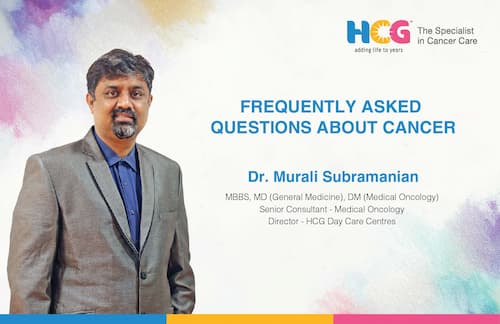
13 Jun, 2022

13 Jun, 2022
Cancer is one disease that is surrounded by plenty of questions. It is important to get these questions answered, as this helps one in making informed health decisions concerning the prevention, diagnosis and treatment. This article aims at addressing some of the most important questions that individuals might have about cancer symptoms, risk factors and treatment.
Here are some of the frequently asked questions associated with cancer:
Answer: This is a common finding in most women who undergo mammography screening; they are part of benign breast disease and do not increase the risk of breast cancer.
Answer: Long-standing fat lumps could be non-cancerous; however, this can be confirmed by an examination only.
Answer: Ulcers that do not heal immediate medical attention. The possibility of cancer is high if you are into the habit of smoking or chewing tobacco. It is advised to consult a doctor and get a biopsy done after consultation.
Answer: Yes. Most cervical cancer cases are associated with human papillomavirus (HPV) infection, which can be sexually transmitted. Immunization with the HPV vaccine helps in reducing the risk of cervical cancer and other cancers caused by HPV. The ideal age for the HPV vaccine is between 9-14 years; however, it can be administered to women until the age of 35 years. It is important to note that as age increases, the HPV vaccine offers limited health benefits.
Answer: Reports of PCOS and its association with cancer are inconsistent; however, a few studies do indicate an increased risk of uterine and ovarian cancers. A Pap smear should be done at the interval of once every 2-3 years.
Answer: TB and lung cancer are slightly challenging to detect and treat as their symptoms often overlap. There are also chances where some lung cancers are diagnosed as TB in the early stages. Key symptoms that might indicate lung cancer include hoarseness of voice, back pain, puffiness of the face, etc. In such cases, a CT scan of the chest is recommended to arrive at the right diagnosis.
The HCG Day Care Chemotherapy Centre is a state-of-the-art chemotherapy clinic. Day care chemotherapy enables patients to return home the same day as their chemotherapy infusion, saving them both time and money. We take a 360-degree approach to promote well-being among chemotherapy patients throughout their treatment.
Phone: 9880522891 / 9480037713
Email ID: kalyannagar@hcgel.com / banashankari@hcgel.com
- By Dr. Murali Subramanian, Senior Consultant – Medical Oncology, Director - HCG Day Care Centres, Bengaluru.